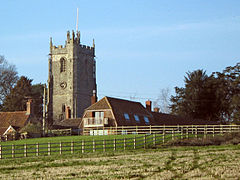Enmore, Somerset
| Enmore | |
|---|---|
 Church of St Michael, Enmore |
|
| Enmore shown within Somerset | |
| Population | 247 (2011) |
| OS grid reference | ST240351 |
| District | |
| Shire county | |
| Region | |
| Country | England |
| Sovereign state | United Kingdom |
| Post town | BRIDGWATER |
| Postcode district | TA5 |
| Dialling code | 01278 |
| Police | Avon and Somerset |
| Fire | Devon and Somerset |
| Ambulance | South Western |
| EU Parliament | South West England |
| UK Parliament | |
Enmore is a village and civil parish 2 miles (3 km) west of Bridgwater on the in the Sedgemoor district of Somerset, England. The parish includes the hamlet of Bare Ash.
The parish name means Duck marsh.
In the Domesday book of 1086, Enmore contained 8 families. From around 1100 the manor was held by the Malet family, with Sir Baldwin Malet obtaining a grant of a Monday market and three-day fair in 1401.
Enmore was part of the hundred of Andersfield.
Barford House sits in a landscaped park. It was built around 1710 for the Jeanes family.
Enmore Castle, built between 1751 and 1756 for John Perceval, 2nd Earl of Egmont, received 'the dismissive mockery of Horace Walpole'. Much of the building, including the offices and stables, were underground and accessed via the dry moat. The Percevals were forced to sell the castle in 1833 to pay off debts. It was bought by Nicholas Broadmead who subsequently demolished a large proportion of the building the following year. The castle once again underwent major change in 1930 when H. H. Broadmead demolished even more of the old building. The remaining portion is now divided into two dwellings.
The parish council has responsibility for local issues, including setting an annual precept (local rate) to cover the council’s operating costs and producing annual accounts for public scrutiny. The parish council evaluates local planning applications and works with the local police, district council officers, and neighbourhood watch groups on matters of crime, security, and traffic. The parish council's role also includes initiating projects for the maintenance and repair of parish facilities, as well as consulting with the district council on the maintenance, repair, and improvement of highways, drainage, footpaths, public transport, and street cleaning. Conservation matters (including trees and listed buildings) and environmental issues are also the responsibility of the council.
...
Wikipedia

